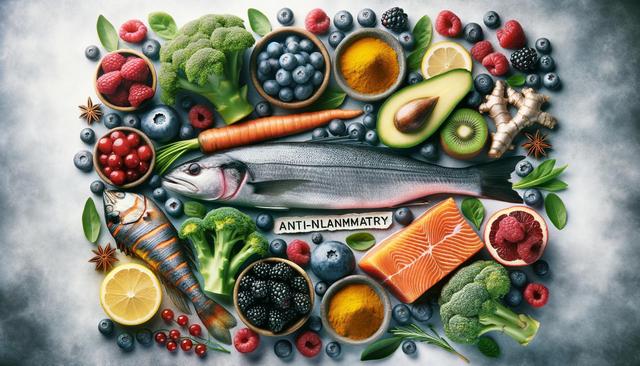Top Anti-Inflammatory Foods to Add to Your Diet Today
Incorporating inflammation-fighting foods like berries, leafy greens, fatty fish, and turmeric supports an anti-inflammatory diet for vasculitis. These nutrient-rich choices help reduce flare-ups, improve immune response, and promote vascular health naturally and effectively in daily meals.

Why Inflammation Matters
Inflammation is the body’s natural response to injury or infection, but when it becomes chronic, it can contribute to a range of health problems including heart disease, arthritis, and autoimmune disorders like vasculitis. Chronic inflammation can damage tissues and organs over time, making dietary choices vital for managing symptoms and supporting long-term health. Eating foods rich in anti-inflammatory compounds can be a proactive way to reduce systemic inflammation and improve your quality of life.
Research shows that certain foods can either promote or reduce inflammation. Refined sugars, processed meats, and trans fats are commonly associated with increased inflammatory markers. On the other hand, foods high in antioxidants, omega-3 fatty acids, and phytonutrients are known to combat inflammation. Incorporating more of these beneficial foods into your daily meals can support immune function, reduce flare-ups, and enhance vascular health—particularly important for individuals managing conditions like vasculitis.
Berries and Their Antioxidant Power
Berries such as blueberries, strawberries, and raspberries are packed with antioxidants and vitamins that help neutralize free radicals and reduce inflammation. These colorful fruits contain anthocyanins, which have been linked to lower levels of inflammatory markers in the body. Berries are also high in fiber, which supports gut health—another key player in immune regulation.
Ways to add more berries to your diet include:
- Adding fresh or frozen berries to smoothies
- Sprinkling them on top of oatmeal or yogurt
- Using them in salads for a sweet-tart contrast
Incorporating a variety of berries into your meals not only adds flavor but also delivers a significant nutritional boost. Their anti-inflammatory effects are particularly helpful for managing autoimmune conditions, and their versatility makes them an easy addition to both sweet and savory dishes.
Leafy Greens and Cruciferous Vegetables
Leafy greens like spinach, kale, and Swiss chard are rich in vitamins A, C, and K, as well as minerals like magnesium and calcium. These nutrients play essential roles in reducing inflammation and supporting overall health. Cruciferous vegetables such as broccoli, Brussels sprouts, and cauliflower also offer anti-inflammatory benefits through their high content of glucosinolates—compounds that help regulate inflammatory responses in the body.
Including more leafy greens and cruciferous vegetables in your diet can be simple:
- Use them as a base for salads
- Incorporate them into soups and stews
- Sauté or steam them as a side dish
These vegetables are nutrient-dense and low in calories, making them ideal for everyday consumption. Regular intake helps maintain a healthy immune system and supports vascular function, which is essential for individuals dealing with inflammatory conditions.
Fatty Fish and Omega-3 Fatty Acids
Fatty fish such as salmon, mackerel, and sardines are among the most effective anti-inflammatory foods due to their high levels of omega-3 fatty acids. These healthy fats help reduce the production of inflammatory cytokines and support cardiovascular health. For people living with vasculitis, omega-3s can be especially beneficial in managing symptoms and improving vascular integrity.
Easy ways to include fatty fish in your meals:
- Grill or bake fish fillets with herbs and lemon
- Add canned sardines or mackerel to salads or grain bowls
- Prepare fish tacos or wraps with fresh vegetables
Eating fatty fish at least twice a week can have a significant impact on inflammation levels. If you’re not a fan of fish, consider plant-based omega-3 sources like flaxseeds, chia seeds, and walnuts, which also offer anti-inflammatory properties.
Turmeric, Ginger, and Other Healing Spices
Turmeric is widely recognized for its active compound curcumin, which has powerful anti-inflammatory and antioxidant effects. Studies suggest that curcumin can suppress inflammatory pathways and may help reduce symptoms in chronic inflammatory diseases. Similarly, ginger contains gingerol, an anti-inflammatory compound that can ease muscle pain and digestive discomfort.
Incorporating these spices into your diet can be both flavorful and therapeutic:
- Add turmeric to soups, stews, or rice dishes
- Blend fresh ginger into smoothies or teas
- Use both in marinades or salad dressings
These spices are easy to use and can be added to a wide range of dishes without much effort. Beyond turmeric and ginger, other spices like cinnamon, garlic, and cayenne pepper also contribute to reducing inflammation and boosting immune health. When used regularly, these natural ingredients can play a role in a balanced, anti-inflammatory lifestyle.
Conclusion: Making Anti-Inflammatory Eating a Daily Habit
For individuals managing vasculitis or other inflammatory conditions, maintaining an anti-inflammatory diet can offer meaningful support for overall health and symptom management. By focusing on nutrient-dense foods such as berries, leafy greens, fatty fish, and healing spices like turmeric and ginger, you can build meals that are both nourishing and therapeutic.
Consistency is key—making small, sustainable changes to your diet can lead to significant improvements over time. Whether you’re preparing meals at home or choosing items at the grocery store, prioritizing inflammation-fighting foods helps support your immune system, reduce flare-ups, and promote vascular health. Embracing these dietary choices is a proactive step toward improving your well-being naturally and effectively.